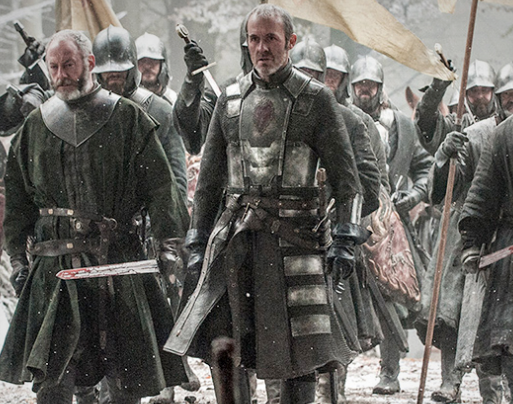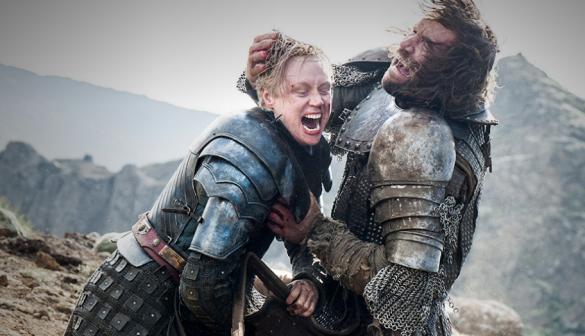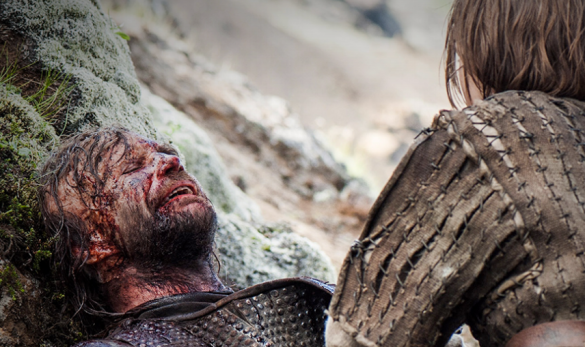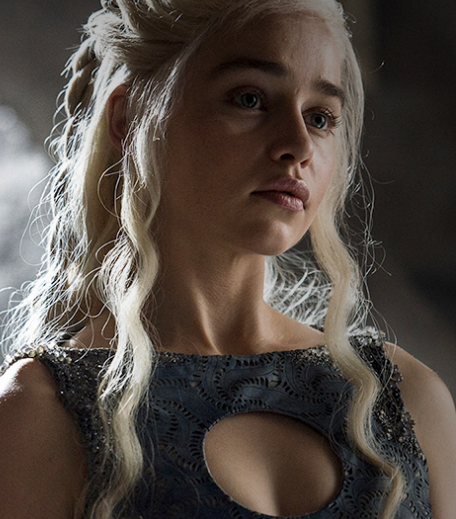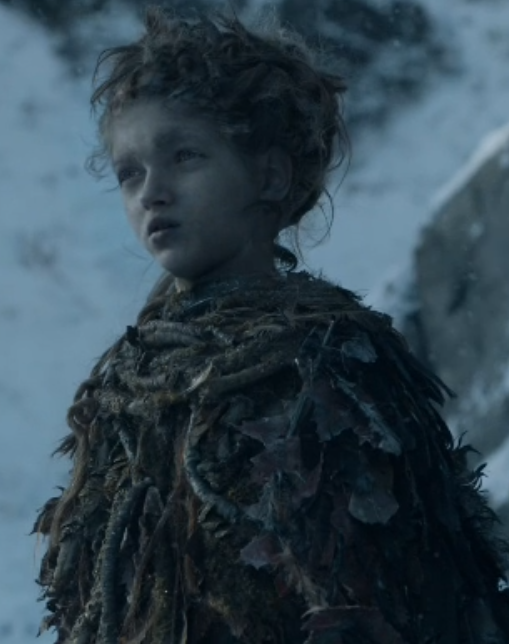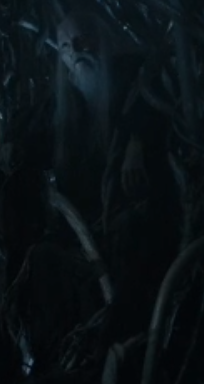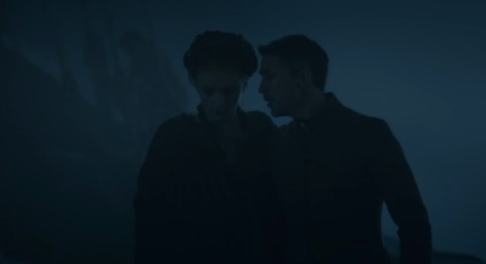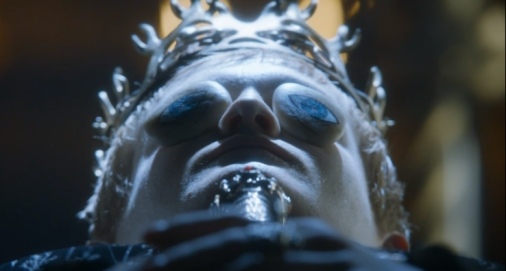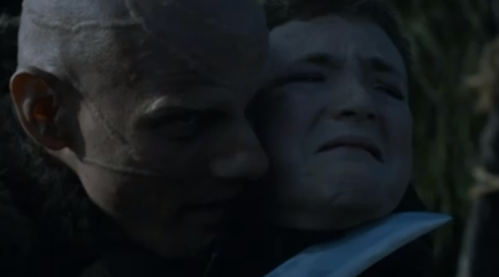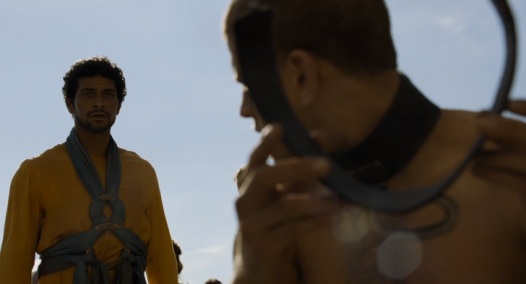Disclaimer: There are no spoilers in this article. Any views or opinions expressed are based solely on where the Game of Thrones TV series currently is and no other knowledge or information is presented in this article.
A NEW SEASON, A NEW WORLD
Finally…We can all breathe a sigh of relief, the wait is over and Thrones is back. Yet, after watching the Season 5 premiere, some of us may have been left feeling a bit underwhelmed, perhaps even a bit slighted. After all, we waited a full year for Thrones to return, shouldn’t the kickoff episode have been packed with a bit more action? No beheadings, no betrayals, no battles and no scandalous sex scenes at all — I mean come on — where were all the things that we’ve grown so accustomed to seeing out of Thrones on weekly basis?
And yet still, it would be foolish to not read between the lines and recognize the way that this premiere episode set the stage for the journey that we are about to embark upon. While there weren’t any major plot progressions or jaw-dropping reveals in this premiere episode, one very loud and unmistakable message was sent: viewers beware, we are in a bold new world. This is not the Thrones world you’ve come to know over the last four seasons and the whatever predictability of the world we grew to know is now gone. Tywin, the man responsible for directing so much of “the game” we’ve come to understand, is dead; Tyrion, another Lannister who kept much of the game in motion, is now halfway across the world; House Bolton officially rules from the seat of Winterfell; while Stannis now calls the shots at the Wall. And these were just a few of the major changes we faced in the opening episode. In this new world, there are new games to be played, new rules to those games and new players to play them. In an episode entitled The Wars to Come, it is important to recognize that the landscape of Westeros has vastly changed in the aftermath of Season 4, and believe it or not, what comes next in this new world appears even more unpredictable than ever.
THE END OF A LANNISTER ERA
Hinting at the fact that things are more different than ever, Season 5 kicks off with something viewers have never before seen — a flashback. We not only see the bratty malevolence that Cercei possessed even as a youth, but we also learn that much of the ill fate Cercei is experiencing before our eyes today, she was actually made aware of 20+ years ago. As Cercei goes to visit a witch in the woods, she tells the witch that she’s been promised to be married to a prince but the witch tells her that she will in fact marry a king. As viewers, we now know that the prince young Cercei was referring to was Rhaegar Targaryen, but that they never married, as he was killed by Robert Baratheon during Robert’s Rebellion. And instead, Cercei ends up marrying King Robert, as the witch told that she would. The witch goes on to tell her that she will be queen, until she is replaced by one younger and more beautiful (Margaery). Most important, referring to Cercei’s three future children, the witch states “Gold will be their crowns, gold will be their shrouds,” referring to their funeral shrouds, implying that death surrounds Cercei’s children. Having lost one child already during his reign as king, having a second son reigning as current king, and her third child, Myrcella, halfway across the world in the hands of their enemies, House Martell, perhaps Cercei should have listened a bit closer to the prophetic words of the fortune teller she sought out as a child.

The young Cercei
Flash forward, we see that Cercei’s problems extend beyond just her children, and that an enormous void is left by the death of Tywin Lannister. Though never actually king, as we look upon Lord Tywin laying dead in the Great Sept, we feel as though we have witnessed the death of a king, a testament to the immense power that Tywin commanded in his life. And as the morose notes of The Rains of Castamere play in the background, a song which once reminded of the strength of House Lannister, we now see a much different version of this once all-powerful house — one that appears to have been reduced to no more than the revenge-driven Cercei and one-handed Jaime. And as they discuss all that Lord Tywin built for their house, Jaime reminds his sister of all the schemers and plotters that will look to prey upon their weakness as he tells her, “they are going to try to take it away…all of it.” And while it appears that we’ve witnessed the end of the Lannister era as we once knew it, Jaime tells Cercei that they must stick together to defend what their father has built, while Cercei seems more intent upon focusing on the fact that Tyrion is still out there somewhere. To say the least, with Tywin dead and Tyrion across the Narrow Sea, there’s discord amongst the Lannister twins at a time when they can least afford it.
OUT OF THE BOX
After weeks of being confined to a crate on a ship, Tyrion is finally released to see the realities of his new world — one where he finds himself in Pentos, with Varys, at the palace of Illyrio Mopatis, a character we’ve not seen since the first season. And right away, Varys reveals something very major. He tells Tyrion that he and Illyrio belonged to a group of people who saw King Robert’s reign as a disaster and aimed to do what was best for the realm by restoring the Targaryen dynasty. In other words, the two of them had been working together behind the scenes to help Khaleesi retake the thrown. Looking back to season 1, we can connect many of the dots. For starters, it was Illyrio Mopatis who hosted Khaleesi and her brother, Viserys, at his palace in Pentos when season 1 started.

From Season 1: Illyrio, in Pentos, harboring Viserys and Daenerys Targaryen
Illyrio brokered the marriage to Khal Drogo in an effort to put an army at the back of the Targaryens. It was also Illyrio who gave Khaleesi her three dragon eggs as a wedding present, which would go on to hatch into three living dragons — the first in hundreds of years. It had been clear that Illyrio was aiding the Targaryens, but it was not until halfway through the first season that we learned that Varys was equally involved with this plot, though much more behind the scenes. As Illyrio visits King’s Landing and walks the dungeons with Varys, Arya overhears them talking about the Targaryen claim which they are backing, and as they discuss the impending war between the Starks and the Lannisters, Illyrio notes that Khal Drogo and the Targaryens are not yet ready to make their move on Westeros, and that they need to buy more time. In short, this scene (see video below) showed us that Illyrio and Varys were plotting for a long time to back the Targaryen restoration. And now, four seasons later, it all comes full circle as Tyrion and Varys end up in Pentos at the palace of Illyrio, and Varys for the first time explicitly tells Tyrion of his plot, one that went terribly wrong.
And as we so often ask ourselves what the true motives of certain characters are, especially ambiguous ones such as Varys, we once again hear what Varys professes to want to most: peace and prosperity for Westeros. Though his plan to get Khaleesi back on the Throne did not yet come to fruition, he seems more decided than ever that she is the one true ruler who could achieve this — one that could strike fear in the powerful Lords of Westeros while inspiring greatness and compassion amongst the weaker. She has the army, the dragons and the right last name. And he now turns to Tyrion to assist him in the pursuit of helping Khaleesi to ascend the Iron Throne.
Speaking of which, it will be interesting to see what comes next for Tyrion. To date, he has been a character utterly defined by his Lannister last name. In Season 4, when Shae would so often beg Tyrion to leave King’s Landing and start a life elsewhere with her, he would always reply that he is a Lannister — what purpose would he possibly have in Easteros, away from “the game” taking place at King’s Landing? After professed that he was good at the game and he enjoyed playing it. Ironically — away from King’s Landing, halfway across the world in Easteros is now precisely where he finds himself, only under an entirely new set of circumstances. So far from his familiar world of King’s Landing and almost entirely removed from his Lannister landscape, will Tyrion find new purpose? What man will he become? And will he ultimately make his way to Mereen, along with Varys, and meet the Mother of Dragons?

TROUBLE IN KHALEESI’S NEW WORLD
Which brings us to the new world that Khaleesi is trying to create amongst the slave cities of Easteros. Symbolic of the old ways she is uprooting and the new world she is creating, Khaleesi’s Unsullied tear the giant harpy off the Great Pyramid of Mereen. And as we recall from the end of Season 4, Khaleesi offers that the slave masters of Yunkai could “live in my new world, or die in their old one.” We see that the more Khaleesi tries to cultivate this new world, one where slavery is absolutely forbidden and justice will always be recognized, we also see the obstacles she faces — ones that may deter her from her eventual goal of reclaiming the Iron Throne. First, we see one of her Unsullied murdered by a member of the Sons of the Harpy, a resistance group that has raised up in defiance of the new world she is trying to create. Khaleesi insists that he be buried publicly in the Temples of the Graces, despite her advisors warning that this will further anger the Sons of the Harpy.
In addition to these issues she faces in Mereen, as Daario Naharis returns from Yunkai, Khaleesi learns that the ex-slave masters have asked her to allow the continuance of the fighting pit, something which she refuses. As she later chats about this with Daario in bed, he reminds her that she is the Mother of Dragons and that if she wants to have success in her new world, her dragons must be a part of it. But, when she goes to check on her two dragons which have been locked up for some time, we see that they have not only grown extremely large, but that they also appear more uncontrollable than ever. Furthermore, it’s been weeks since anybody has spotted Drogon, the largest of the three dragons. As this season unfolds, it will be interesting to see how dedicated Khaleesi remains to establishing her new world versus shifting her sights towards the ultimate goal of claiming the Iron Throne.
THE WALL
Elsewhere, we once again see that everything has changed with major unpredictably surrounding what comes next at the Wall. In the aftermath of the battle between the Night’s Watch and Mance Rayder’s army of Wildlings, we see a depleted Night’s Watch that is now somewhat backed by Stannis Baratheon’s army. As Jon Snow ascends the Wall, Melisandre asks him if he is a virgin. When he informs her that he is not, she responds, “good,” with a sinister grin. Atop the Wall, Stannis tells Jon Snow that he plans to retake Winterfell from House Bolton and wants the Wildlings to fight for him. All Mance has to do is bend the knee, to which he of course refuses. As Jon Snow tells Mance he is making a mistake, Mance responds “All I ever wanted was the freedom to make my own mistakes.” Even when faced with being burned alive, Mance would rather die a free man than acquiesce to the rules of the southern kingdoms and bend the knee. And as everybody looks on as he begins to burn, Jon Snow puts an arrow in his heart to prevent the horrible death Mance was about to experience.
EVERYTHING ELSE
In a roundup of some of the smaller scenes of the premiere episode, we see the continued journey of Brienne and Pod, who in their new world, appear to lack any true purpose or destination. Sansa, appearing darker than ever, continues to journey on with Littlefinger, and on their new path together, leave Robin Arryn with Lord Royce for safekeeping. We also see Lord Baelish receive a message, which undisclosed, he stashes in his sleeve. Once in private, Baelish tells Sansa that they are going somewhere so far away that even Cercei cannot find Sansa. And back in King’s Landing, Lancel Lannister, Cercei’s cousin, reappears as a Sparrow, stating that he has found peace in the Light of the Seven. He apologizes to her for their unnatural relations, and also for the part he played in serving Robert Baratheon the very strong wine, which led to his hunting accident and eventual death. Though it had been implied previously, we receive explicit confirmation of the role that Cercei played in killing her husband and the King. And as the season premiere comes to a close, while we may not have witnessed any singularly gamechanging events, this new season presents a new world, one where the game appears to be changing and anything could be possible.




